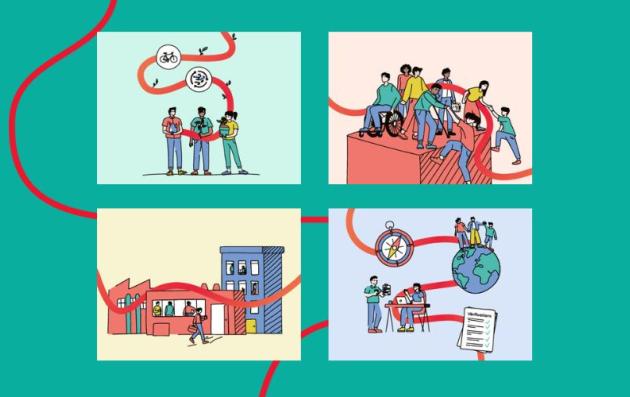Date of label : 29/10/2024
-
Lyon Metropole , France
-
Size of city : 1.400.000 inhabitants

This image illustrates the social, economic, and environmental impacts, as well as levers (governance, cooperation, and impact-driven companies).
Summary
Economic development in Lyon Metropole (FR) is now driven by social and environmental objectives, transforming the metropolitan territory and supporting other public policies. To implement this approach, the Metropolis created two tools:
- The Observatory of Positive Impact Economy is a digital management tool that measures the contributions of companies to sustainability policy goals, and unites them around shared goals.
- KelImpact allows companies to assess and refine their territorial impacts.
Together, these tools identify company vulnerabilities, prioritise actions, and enhance public services in the Metropolis of Lyon.
The solutions offered by the Good Practice
Two tools are central to Lyon Metropole’s strategy for sustainable economic growth, aligning closely with the city's broad strategic objectives:
- The Observatory of Positive Impact Economy: Established in 2023, it provides detailed analysis of business contributions to sustainability, structured around themes of inclusion, environmental viability, and economic sustainability. It promotes collaboration by aligning businesses with shared goals.
- KelImpact: Currently with over 1 000 users, it measures the territorial impacts of businesses, enabling them to assess and enhance their sustainability impact, focusing on economic, social, and environmental contributions.
Future developments will include measuring material footprints and developing impact-driven activities to refine tool effectiveness. This will enhance the two tools' capabilities to provide comprehensive insights into business sustainability practices. Lyon Metropole aims to collaborate with companies to build a resilient and thriving economic model, responsive to climate and social challenges.
These initiatives demonstrate Lyon Metropole's commitment to transforming its economic landscape into one that is more sustainable, supported by strategic documents and initiatives related to urban development and sustainability.
Building on the sustainable and integrated urban approach
The KelImpact tool employs a systemic approach to tackle urban challenges, integrating environmental, economic, and social dimensions. This comprehensive framework revolves around four major axes:
- Inclusion and social justice.
- Environmental viability.
- Economic sustainability.
- Health and well-being.
Two key levers—governance and cooperation, and impact-driven activities—support these axes. Each axis has subcategories where actions are targeted and outcomes are measured, for example, climate, energy, mobility, digital practices, and eco-design for the environmental viability axis.
The Observatory of Positive Impact Economy includes subcategory indicators, developed in collaboration with all Lyon Metropole’s departments, including water, roads, and environmental services, and also relevant stakeholders. This ensures that the indicators are relevant, practical, and aligned with strategic goals.
This integrated approach enables Lyon Metropole to address urban challenges simultaneously, fostering balanced and sustainable development. The Metropolis’s robust framework is therefore capable of driving meaningful progress, ensuring environmental, economic, and social objectives are met in harmony.
Based on a participatory approach
KelImpact was developed with the participation of students from Sciences Po Lyon, who contributed to its conceptual framework, and around 20 partner companies, who helped construct and test the tool. Project managers from various departments of the Lyon Metropole have been involved, including water management, road infrastructure, energy, social inclusion, and economic development, to ensure the tool was practical and aligned with broader strategic goals.
Lyon Metropole established an Impact Committee, composed of about 20 members, including the Urban Planning Agency, to guide the Metropolis's actions regarding impact. This committee’s request for a common strategic framework led to the creation of the Observatory of Positive Impact Economy tool.
This robust participatory approach, with diverse stakeholders working together, was key to creating comprehensive and effective tools for measuring and enhancing territorial impacts.
What difference has it made?
Over 1 000 organisations have completed the KelImpact assessment, enabling Lyon Metropole to tailor its services based on business needs. For instance, with no companies with fewer than 10 employees having completed their carbon footprint assessments, the Metropolis developed a support service to help small enterprises with their carbon accounting.
The Observatory of Positive Impact Economy tool guides resource allocation to meet strategic goals. To achieve energy consumption reduction targets, a 6% annual decrease is required, but currently only a 2.3% reduction is being achieved, indicating a need to intensify efforts on energy savings.
The local impact is significant. By addressing specific needs and gaps, such as the lack of carbon footprint assessments in small businesses, the Metropolis has enhanced its support structures, leading to more effective sustainability initiatives. The Observatory's data-driven approach helps achieve goals, and fosters continuous improvement and resilience among local businesses.
Why this Good Practice should be transferred to other cities
Lyon Metropole’s practice shows how European cities can find innovative solutions to drive policies such as the European Green Deal, achieve the transition towards a climate-neutral economy, and realise sustainable economic development on their territories.
Both tools, KelImpact and the Observatory of Positive Impact Economy, help companies assess and improve their social, economic and environmental impacts, helping them build inclusive and sustainable businesses that benefit the region. The practice facilitates collaboration between companies and cities, ensuring a resilient and thriving economy that is responsive to climate and social challenges.
The two tools align with Lyon Metropole's strategies and national regulations, such as requirements for carbon footprint assessments for organisations with over 500 employees, and mandates to hire people with disabilities. Local targets also reflect national goals, like reducing greenhouse gas emissions.
The key factors to a successful transfer of the methodology are:
- Understanding the territory's main issues.
- Identifying how economic development can address the main issues.
- A collaborative approach involving all stakeholders to achieve a comprehensive and systemic vision.
The practice, and the specific methodologies for the two tools, can be tailoring to suit local regulations and the specific needs of other cities.
Lyon Metropole was the first local government in France to develop such tools, attracting interest from several local authorities. Recently, the Metropolis shared its experience with about fifteen European economic development agencies.
